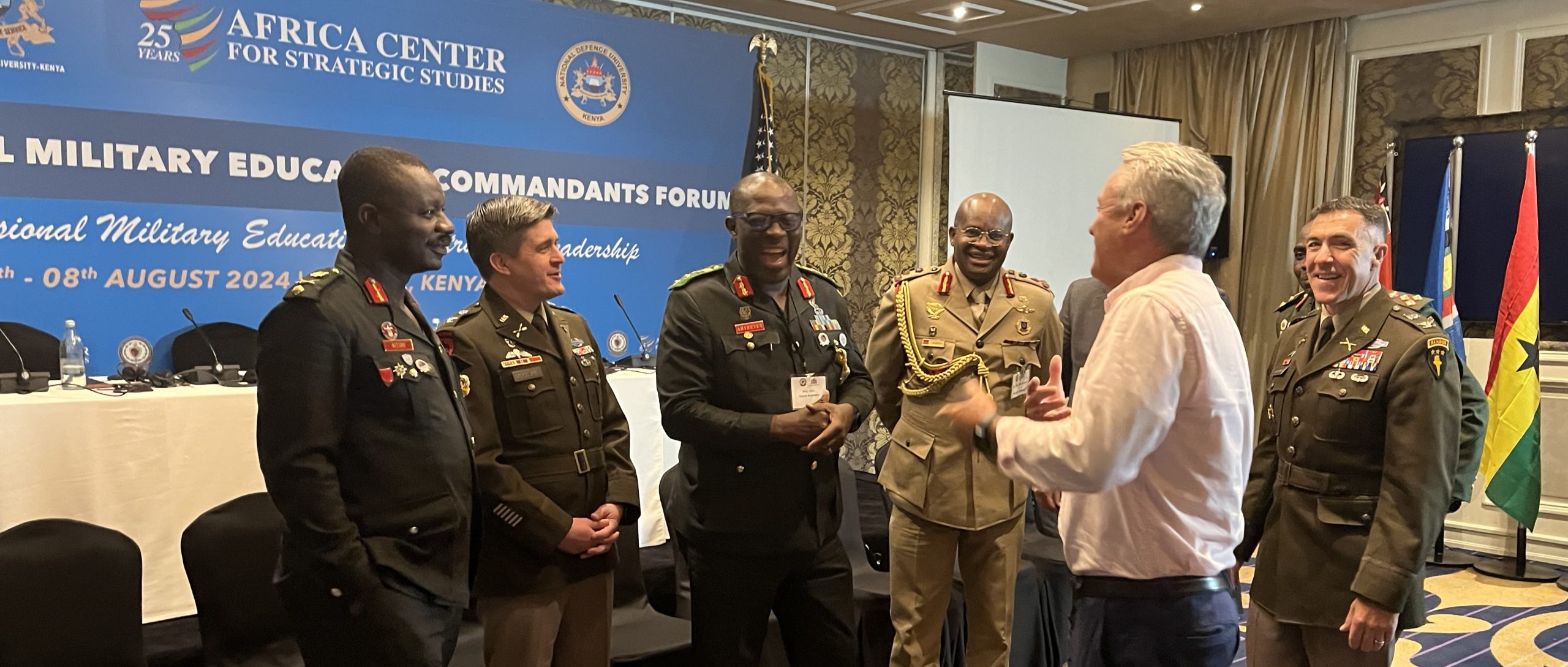English | Français | Português
Building on the Africa Center’s long history of engaging practitioners on security sector governance, military professionalism, and the role of professional military education in Africa, the Center elevated its focus on these issues in 2022, at the time of the U.S.-Africa Leaders Summit. As the newly-arrived faculty lead for this effort (having served in security cooperation positions in South Sudan, Nigeria, and Somalia), I wanted to take this opportunity to introduce myself and discuss why the concept of military professionalism is so vital to any military, why it matters to Africa’s security, what the Africa Center is doing to enhance military professionalism, and ways that Africa Center alumni can become more involved in these initiatives.

Military professionalism is a concept that many militaries—including that of the United States— struggle to clearly define. In one sense it can be equated with discipline and conduct; in another sense it indicates aspects of a vocation. Writing in 1957, political scientist Samuel Huntington extended Max Weber’s work on professionalism to the military’s officer corps. In his seminal work, The Soldier and the State, Huntington described military professionalism as possessing the qualities of expertise in military affairs, responsibility to use that expertise on behalf of citizens, and a sense of institutional pride and proficiency. Huntington argued that by increasing military professionalism, military institutions would focus their efforts on maintaining their expertise and integrity in the eyes of citizens and would come to value their distinctive role above the political fray. Clearly separating the military and political spheres would enable what Huntington termed the objective control of the military by civilian leaders.
While Huntington broke ground in the study of civil-military relations, his definition of military professionalism may be a poor fit for the militaries of Africa. This is because Huntington’s concepts of military professionalism and objective control were based on observing a military focused on protecting a country from external threats. In this case, internal threats were principally dealt with through domestic law enforcement means, not military means1. So how should we think about military professionalism in the context of militaries that often have responsibilities to address external and internal threats?
Recently, Dr. Pat Paterson of the William J. Perry Center for Hemispheric Studies—a sister regional center to the Africa Center—outlined a concept of military professionalism that is perhaps more relevant for African countries. He argues that there are four key components to evaluate the state of military professionalism in a military: formal military education and training, military subordination to elected civilian officials, knowledge and practice of International Humanitarian Law (commonly known as the Law of Armed Conflict) and International Human Rights Law, and a functioning program of professional military ethics. These components—when exercised together and practiced individually or corporately—produce a military that uses its expertise to serve the interests of the government and its citizens.
Military professionalism is a vital component of a comprehensive government approach to addressing Africa’s security challenges, many of which are internal. Internal conflicts are what General Rupert Smith calls ‘war amongst the people’ as opposed to an external conflict or ‘war between peoples.’ Because internal conflicts take place within both geographic and social boundaries, the manner in which a military uses its coercive power in domestic situations is a critical factor in whether the conflict is resolved or continues.
Military professionalism, in Paterson’s sense, is a powerful tool that enables a military to substantially contribute to the resolution of internal conflict alongside other government actions. High levels of military professionalism enable a military organization to thoughtfully apply its expertise in the military arts and sciences and apply force in a way that is strategically, and not just tactically, effective. This can minimize unintended consequences of the use of military power, such as extralegal detentions, perceived partiality, and civilian casualties that could tarnish citizens’ perceptions of the military and government. Furthermore, military professionalism contributes to increased levels of popular support in the military and government and perceptions of their legitimacy, leading to a stronger bond between the government and its citizens.
The Africa Center is working to enhance military professionalism on the continent through three main approaches. The first is by working alongside African professional military education institutions. These organizations have the responsibility for passing on knowledge unique to the profession of arms, as well as norms, perceptions, and standards of conduct to military personnel. In 2023, the Africa Center held a forum with commandants from several professional military education institutions to discuss ways that their institutions can produce graduates who are better prepared to lead military organizations in the service of the government. The Africa Center also implements the U.S. State Department’s Africa Military Education Program (AMEP). Under this initiative, the Africa Center deploys faculty from U.S. professional military education institutions to help enhance the content and delivery of curriculum with their African counterpart institutions.
The second way the Africa Center is enhancing military professionalism is by working in support of U.S. Africa Command in its many engagements with partner militaries, including aiding the Command in implementing its Enlisted Development Strategy.
Third, the Africa Center has contributed to thought and debate about military professionalism through publications such as “Oversight and Accountability to Improve Security Sector Governance in Africa,” by BG Dan Kuwali, “Creating a Culture of Military Professionalism in Senegal,” and “Deepening a Culture of Military Professionalism in Africa,” some of which are required reading in African professional military education institutions.
Africa Center alumni interested in discussing any of these issues further can reach out to me via the Community, Alumni, Partnerships, and Engagement team.
Notes
- ⇑Huntington’s model was based on his analysis of patterns of United States civil-military relations. As a result of the experience living under an oppressive colonial power, America’s founding fathers argued that domestic law enforcement agencies should be responsible for responding to internal threats, with very few exceptions.

